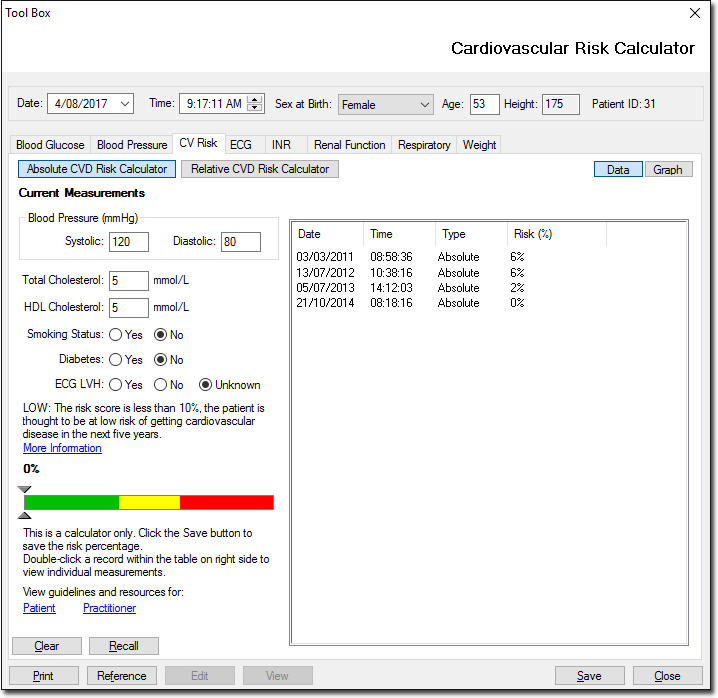Using the Cardiovascular Risk Calculator
Before you begin
Procedure
-
From within the Clinical Window, select . The CV Risk tab appears. Select which calculator you wish to use. If you select the Absolute calculator, the following fields will be pre-populated with data, where available:
- Sex at Birth. As sourced from the patient's record.
- Age. As sourced from the patient's record.
- Systolic blood pressure. As sourced from the most recent blood pressure 'sitting' data, recorded within the last 2 months.
- Diastolic blood pressure. As sourced from the most recent blood pressure 'sitting' data, recorded within the last 2 months.
- Smoking status. A patient who has quit smoking within the last year will be considered a smoker for the purposes of the calculator.
- Total Cholesterol. As sourced from the most recent Total Cholesterol data, recorded within the last 2 months.
- HDL Cholesterol. As sourced from the most recent HDL Cholesterol data, recorded within the last 2 months.
- Diabetes. As sourced from the patients past medical history, see Absolute CVD Risk Diagnosis Descriptions.

-
Options:
- For patients who are automatically considered 'high risk', simply click Save to automatically document the risk value as >15% in the Tool Box. This will also add a note to the patient's Progress Notes. There are no further actions required. You may exit the Tool Box.
- For all other patients, click Absolute CVD Risk Calculator Proceed now to Step 3.
-
Enter values for the following fields:
- Systolic Blood Pressure - (Enter a value between 50 and 300).
- Diastolic Blood Pressure - (Enter a value between 20 and 150).
- Total Cholesterol - (Enter a value between 2 and 30).
- HDL Cholesterol - (Enter a value between 0.2 and 20).
- Indicate the patient's smoking and diabetes status, and ECG LVH. Note that this is not the same as 'echo LVH' which is a lesser risk factor.
-
Click Save A new entry appears within the recorded data on
the right-hand side of this window. Note that this data is saved to this window for
future reference, and a record is made in the patient's Progress Note.
Results > 15% are not displayed in the table of results, as such values are superfluous.
